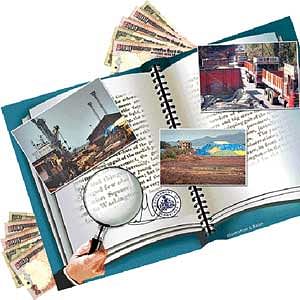

Belekeri, a minor port with scenic unexplored beaches, near Ankola of Uttara Kannada district, stands defamed after Karnataka Lokayukta Santosh Hegde, acting on people’s complaints, deputed forest department sleuths who unearthed a major iron ore export scam.
Billed as a ‘good port’ since the British Raj, the non-descript port apparently proved a safe haven for the mining mafia from as far away as Bellary and Hospet, until a shocking expose of corruption at high places was made in January this year. The bust revealed that lakhs of tonnes of superior quality iron ore, graded 64 Fe and valued highly on the export market, was illegally extracted by miners in Bellary and Hospet, the home ground of Mines and Geology Minister G Janardhan Reddy, transported overland by using fake passes and permits of the Mines and Forest departments, and exported out of Belekeri and Karwar ports under the watchful eyes of the port authorities.
The rip off finale came in June when five lakh metric tonnes of iron ore that was being illegally transported was seized by forest officials and kept under the safe custody of the Belekeri port authorities. Belekeri port conservator Mahesh Biliya immediately wrote to the forest department pleading his inability to safeguard the seized ore, which had been lying right there before the seizure. The mining and export companies, to whom the ore belonged, moved court praying for release of the consignment and help them meet export commitments. The court obliged with the rider that the ore could be released subject to verification of documents and submission of indemnity bonds by the litigant companies. The forest department refused to release the ore as it found the documents to be fake. Within days, the five lakh metric tonnes bounty went missing, forcing the forest department to file a complaint with the Ankola police.
The state government, in a vain bid to lock the stables after the horses had bolted, transferred some low-level port and forest officers and ordered suspension of the Karwar deputy conservator of forests. The action was like the proverbial last straw that broke the camel’s back and Lokayukta Santosh Hegde rushed his resignation to the Governor (which he has since withdrawn).
As the mining season closed because of the monsoon, the hectic activity at the otherwise tranquil Belekeri and Karwar ports have come to a standstaill. But the heat and dust generated by the mining controversy is still engaging an overtly repentant government, the national media, and public debates and sentiments.
Now, a month after the iron ore went missing, the ports department is pointing an accusing finger at two private companies - Shree Mallikarjun Shipping Pvt Ltd (SMSPL) and Adani Enterprises - and has even cancelled their export licences. The reason: the companies spirited away (exported) the seized ore despite the department’s strict bar. But Justice Hegde insists that in all 11 companies, involved in the illegal transportation of ore, are liable.
SMSPL belongs to Satish Sail, a Congress party sympathiser, who contested the Assembly by-election from Karwar in 2008 on a Congress ticket, while the Adanis are Ahmedabad-based with operations across several countries.
Operation salvage
In a quick salvage operation, Chief Minister B S Yeddyurappa admitted in the legislature that there was a thriving illegal mining and export business, but also went on the defensive promising an overarching probe that would cover a decade of illegal activity across the State. Other actions include closure of Belekeri port until sanction for the illegally expanded operations are obtained from the Centre and police powers for Range Forest Officers to prosecute offenders bypassing the local police.
The whole drama unfolded when Justice Hegde visited Karwar in January to attend a public function. Some local people, frustrated by their unending fights against the movement of heavily laden iron ore trucks on National Highways 17 and 63 disturbing their peaceful existence since 2005, saw a saviour in Justice Hegde. They complained that the transport of ore, by using fake permits, had destroyed the environment and ecology of the region.
The Lokayukta deputed his team to investigate the allegations. The team, led by Chief Conservator of Forest U V Singh, seized loads of forged and fake documents used by the transporters to pass through the various checkpoints before the consignment reach the ports.
On the instructions of Karwar DCF R Gokul, forest officials seized five lakh metric tonnes of iron ore at Belekeri port and about 50,000 tonnes at Karwar port. Of the 60 heaps of ore stocked at Belekeri port, forest officials marked 24 heaps as seized and put them in the custody of the port officer. But the export of authorised ore continued unhindered.
Immortal permits
Mine owners mine in excess of sanctioned limits recycling legal permits many times over. The ore is then transported in overloaded trucks, which pass multiple checkpoints with inpunity although rules state that not a tonne of iron ore can be transported without necessary road permits from the Department of Mines and Geology (DMG). But the fact that almost 35.31 lakh MT of iron ore was transported to the ports without DMG permits shows that the mechanism to check illegal mining trade is dormant, if not absent.
Copies of the mining lease, way permit and load details have to be submitted at every checkpost. The moot point is how such a huge haul of iron ore was exported bypassing the multiple checks. Last but not the least, neither did the port authorities try to verify the documents at the entry point, nor did the Customs department seek to know the source of the ore before allowing export.
Now, the Lokayukta as well as the state criminal investigation department (CID) are conducting parallel inquiries. The CID team is familiarising itself with the functioning of the port and the role of various departments concerned. Their immediate task is to find the source of the iron ore.
The common refrain of officials in the departments of Ports, Customs and Forest, who wish to remain anonymous, is: “Powerful people are involved in the illegal trade. But only lower rank officers are penalised." The ultimate loser though is the state as crores of rupees in royalty do not go to the state’s coffers.
The saga of illegal mining
»Illegal mining in Karnataka is a lengthy and compelling saga. The mining of rich iron ore deposits in the districts of Hospet, Bellary, Tumkur and Sandur was not profitable a decade ago due to low prices of ore. Mining licenses were given to state-owned MML and private players. MML transferred its mining right to private mining barons. The price of ore rose from Rs 300 a tonne in 2002-03 to Rs 5,000-7,000 a tonne by 2005-06 due to global shortage and demand. The benefit of the high price went to the private profiteers and not to the state coffers. It also lured a new class of entrepreneurs who indulged in illegal mining.
Karnataka had lost around 10,598 hectares of land to mining and given the depleting forest cover, the Kumaraswamy-led coalition government of JDS-BJP asked Lokayukta Santosh Hegde to investigate.
Justice Hegde submitted a 1,600 page report indicting the decision makers for flouting the law and conniving with the illegal mining lobby, to the Yeddyurappa-led BJP government in December 2008. Since then the report has been in cold storage. In April 2010, the state sent an Action Taken Report after being prompted by the Centre. But ombudsman Hegde dubs it as an Action ‘to be’ taken report.
Some highlights of the report::
- Politico-bureaucrat nexus with private players at heavy cost to the state. Largescale illegal mining which deprived the state even the token royalty of Rs 27 a tonne then (now raised).
- Sub-leasing of mining rights by private mine owners and state-owned MML as well.
- Flouting of IBM guidelines on scientific extraction of ore.
- Harm to the environment by transport of ore in open lorries; socio-economic problems such as illegal miners luring young men to act as informants with money, bikes, cell phones.
- Suggestions include stopping unprofitable exports; leasing mines for value addition purposes.